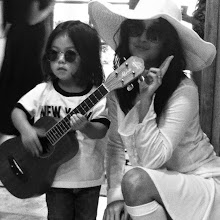Thursday, September 23, 2010
LE: Kandinsky's Color Study
I used Wassily Kandinsky's Color Study of Squares as an exercise on mixing color. Rather than having them paint any random color, I had students think of the painting as a math chart but instead of adding numbers, they were adding color. The first two circles within a square were two numbers that they were going to add together to equal the third circle. The third circle would be the "sum" of numbers 1 and 2. That way, if they forget how to make the color turquoise, they can look for that color in their chart and see that they used green and yellow to make that color. The background color was their choice. I drew the grids in advance and demonstrated how to add just the right amount of water to their paint since some students were struggling with that.
Wednesday, September 15, 2010
UE: Hiroshige's Mountains
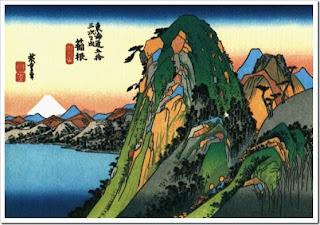 UE's first lesson was based on Ando Hiroshige's
UE's first lesson was based on Ando Hiroshige'sprint, Lake By Hakone. Hiroshige was a ukiyo-e artist, a general name for Japanese woodblock prints or paintings, but the English translation means "floating world". I told students to think of this description when choosing their colors so their painting would express the beauty of a surreal place. After students sketched out their landscape, they painted the mountains gradationally, going from dark to light. The last steps were to add trees and outline everything with black pen.
Tuesday, September 14, 2010
LE: The American White Pelican
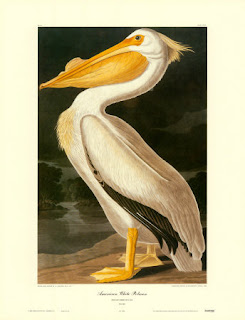 LE is continuing their animal theme this year so I thought of starting off with John Audubon's bird paintings. He had a great sense of composition, capturing the natural movement of birds in their habitat and utilizing the entire space of the page. While we discussed basic facts about pelicans, students followed along with my demonstration. They first drew a large "S" curve on their page, then drew specific features. When they were ready to paint, we briefly discussed why we needed brushes in different sizes and how to mix dark colors so the white feathers of the pelican would stand out.
LE is continuing their animal theme this year so I thought of starting off with John Audubon's bird paintings. He had a great sense of composition, capturing the natural movement of birds in their habitat and utilizing the entire space of the page. While we discussed basic facts about pelicans, students followed along with my demonstration. They first drew a large "S" curve on their page, then drew specific features. When they were ready to paint, we briefly discussed why we needed brushes in different sizes and how to mix dark colors so the white feathers of the pelican would stand out.
Friday, September 10, 2010
MS: Crankin' out those gestures
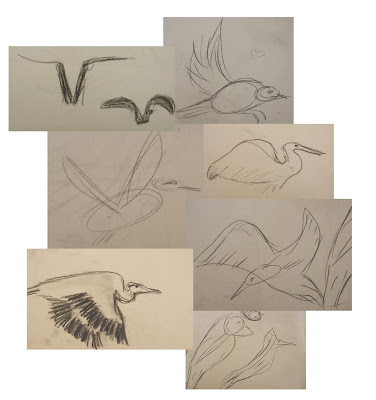 It's good to be back:-) In preparation for the middle school field trip on which students will be documenting birds and nature in their journals, they learned how to quickly capture the motion and basic form of different birds looking at photo references. In other words, gesture drawing. It was initially awkward and uncomfortable since students were used to drawing the outline of a form rather than first breaking it down into shapes. I demonstrated how to start with a single curve of the spine depending on the bird's posture, then added circles and ovals for the different body parts using my arm to move the charcoal rather than my wrist. This helps keep the form fluid and not too tight. I timed the students starting at 5 seconds and progressively gave them longer periods.
It's good to be back:-) In preparation for the middle school field trip on which students will be documenting birds and nature in their journals, they learned how to quickly capture the motion and basic form of different birds looking at photo references. In other words, gesture drawing. It was initially awkward and uncomfortable since students were used to drawing the outline of a form rather than first breaking it down into shapes. I demonstrated how to start with a single curve of the spine depending on the bird's posture, then added circles and ovals for the different body parts using my arm to move the charcoal rather than my wrist. This helps keep the form fluid and not too tight. I timed the students starting at 5 seconds and progressively gave them longer periods.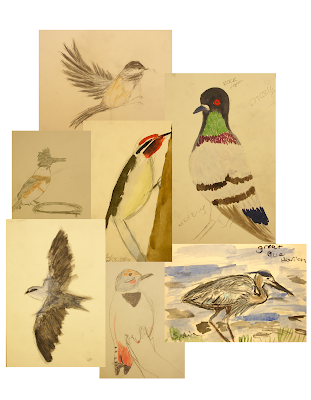
After multiple sessions of gesture drawings, students drew a more detailed version using paint and colored pencils. I'm excited to see the students' journals when they come back. Really hope these helped!
Subscribe to:
Posts (Atom)












